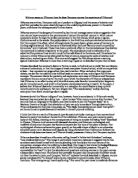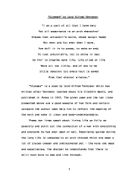The individual’s in “Ulysses”, by Tennyson, on the other hand is different, because he wants to shirk his responsibilities and leave. While the individual in the first poem was resigned toward his fate, Ulysses wants to change his fate by instead of staying and ruling over his land like he should. Instead traveling one last time before his death is more appealing. He wants to leave his kingdom to his son Telemachus, whom he thinks is better fit to rule.
Ulysses starts off by saying, “Match’d with an aged wife, I mete and dole unequal laws onto a savage race, that hoard, and sleep, and feed, and know not me.” (ll. 3-5). With the long vowel sounds, the long e sound especially, there is a tone of weariness, as if it will never end. To “sleep” and “feed”, and “know not me”. This application of diction helps the reader get the feel of what Ulysses is going through. The poem develops on, and Ulysses says, “Yet all experience is an arch wherethro’ gleams that untravell’d world,” (ll. 19, 20). Imagery makes it easier for the reader to picture this scene in her mind. Ulysses wants to leave his responsibilities behind. His responsibilities are such a burden and traveling is more alluring. But this doesn’t mean that Ulysses has forgotten about his responsibilities entirely; Telemachus is there to fill in for him. Ulysses seems a little guilty about leaving his son behind with his duties by him saying, “Most blameless is he, centred in the sphere of common duties,” (ll. 39, 40). Tennyson words the sentence different. Instead of him saying, “he is blameless”, he says, “most blameless is he”, which makes Ulysses guilt fairly stand out. But unlike the individual in Frost’s poem, he leaves his responsibility on his son for pleasure, while the other individual foregoes this pleasure for the sake of responsibility.
The second two poems being compared are “Birches” and “Lotus Eaters” which both deal directly with the theme of responsibility. In the poem “Birches”, the speaker talks about his time as a young boy and how he would like to, now as a grown man, go back from time to time, when the going gets tough, and revisit that light, carefree, youth again. At first Frost compares responsibility to an ice storm saying, “But swinging doesn’t bend them down to stay as ice-storms do.” (ll. 4, 5). It’s as if Frost is saying that nothing can wear a person out like a burden-full life. But the speaker comes face to face with fact when he acknowledges why the birches are bent. He says, “When truth broke in with all her matter-of-fact about the ice-storm,” (ll. 21, 22). Frost giving “Truth” human attributes makes the line sound all the more real. It puts an emphasis on making it stand out. The reason as to why the birches are bent is because they have been bowed by time. And, “Though once they are bowed for so long, they never right themselves.” (ll.15, 16). It is too late, nothing can change back time.
In the poem, it seems as if the birch tree symbolizes the speaker’s method of returning to this state of innocence because Frost says, “I’d like to go by climbing a birch tree….till the tree could bear no more, but dipped its top and me down again.” (ll. 54-57). This implies that he wants to go back whenever responsibility is too much for him. You also see the stages of the tree bending. At first Birches are just swaying in the wind, “When I see the birches bend left and right across the lines of straighter darker trees,” (ll. 1, 2). They haven’t been fully bent. This is the speaker in his youth. But then Frost goes on to say, “And they seem not to break; though once they are bowed so low for long, they never right themselves.” (ll.15, 16). And this is the speaker in his adulthood, already bent over with responsibility, and it’s too late to go back to that state of innocence again. But it seems as if in the end, the speaker, all though he keeps on wishing, knows that he can never return to the time of pre-responsibility. When life was carefree and good. Frost implies through this poem that life is full of responsibility and its good to do them, but even the most responsible wish for a break every once and a while.
In the next poem by Tennyson, Tennyson approaches the theme of responsibility a little differently. Again Tennyson is using Ulysses, but this time he is with his man. And instead of the men in the poem, after a brief spell and relaxing, go back to there homes and resume life, they stay on the Island of the Lotus Eaters. The poem starts off with the men arriving on the Island, and Ulysses observes, “And like a downward smoke, the slender stream along the cliff to fall and pause and fall did seem.” (ll. 8, 9). Everything on the island is moving so slow. The stream seems to fall, then pause, then fall again. The imagery creates a picture as if the reader is there at the scene. Then the people of the island come out and welcome them with a plant: the lotus flower. After the Men eat them they start singing. Tennyson again utilizes diction with the line, “ Than tir’d eyelids upon tir’d eyes.” (ll. 51). The repetition of the word “tir’d” emphasizes exactly how tired the men have become.







